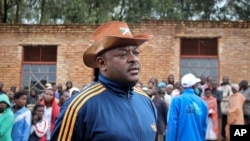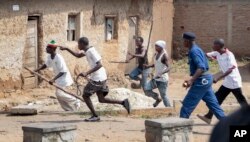A United Nations probe into the human rights situation in Burundi finds government opponents are subject to mass violations including summary executions, disappearances, arbitrary arrests and torture.
Burundian President Pierre Nkurunziza’s recent declaration that he will support the future President of the Republic when his mandate ends in 2020 has been welcomed by several countries. But, in its latest report, the U.N. Commission of Inquiry on Burundi casts doubt on the credibility of Nkurunziza’s declaration noting it lacks a clear and firm commitment by the sitting leader not to run for president in the upcoming elections.
Commission member Francoise Hampson says the situation in Burundi remains very disturbing. Since the beginning of the year, she says the commission has documented human rights violations targeting those opposed to the proposed amendment of the constitution.
“In particular, the commission has received reports of numerous arrests of people who called for a “no” vote in the referendum, who sought to meet to discuss the draft amendment of the Constitution, or who refused to join the CNDD-FDD," she said. "The detentions that followed these arrests resulted in cases of torture and ill-treatment.”
The CNDD-FDD, short for the National Council of the Defense of Democracy-Forces for the Defense of Democracy, is Burundi’s ruling party.
Despite widespread opposition, Burundi, last month voted for a constitutional change potentially allowing the president to remain in power until 2034. The Commission says it has received information on people who were executed or abducted because they were members of opposition parties or refused to join the ruling party.
The investigators blame the Imbonerakure, the youth wing of the ruling party, for being behind most human rights violations during the referendum campaign and of harassing, controlling, and intimidating the population, forcing many to flee the country.
Burundi Ambassador Renovat Tabu accuses the Commission of lacking objectivity. He says its report is politically biased and is based on a campaign of disinformation. He says his country reserves the right to bring to justice those who defame the government.











